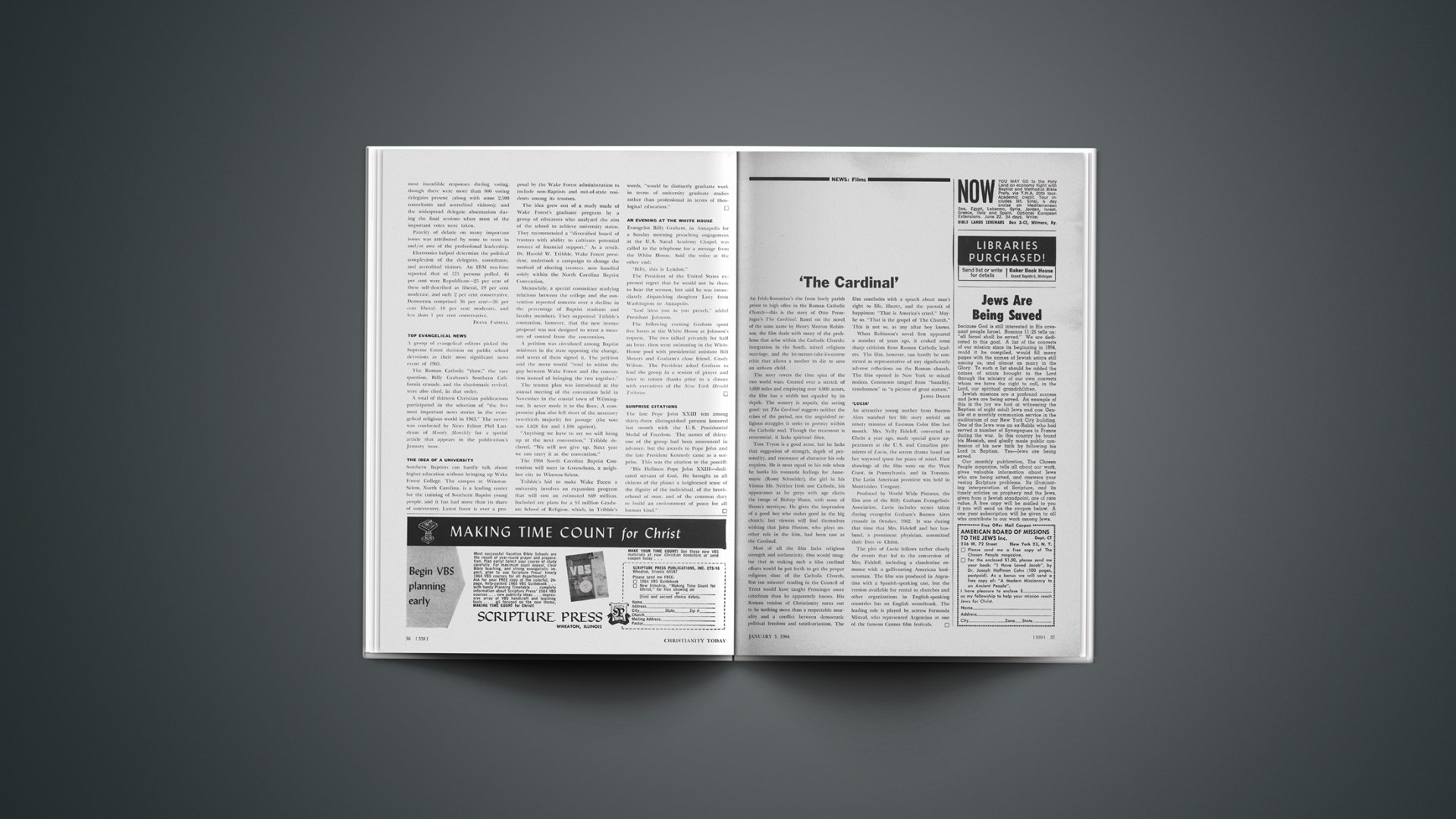An Irish-Bostonian’s rise from lowly parish priest to high office in the Roman Catholic Church—this is the story of Otto Preminger’s The Cardinal. Based on the novel of the same name by Henry Morton Robinson, the film deals with many of the problems that arise within the Catholic Church: integration in the South, mixed religious marriage, and the let-nature-take-its-course ethic that allows a mother to die to save an unborn child.
The story covers the time span of the two world wars. Created over a stretch of 5,000 miles and employing over 4,000 actors, the film has a width not equaled by its depth. The scenery is superb, the acting good: yet The Cardinal suggests neither the crises of the period, nor the anguished religious struggles it seeks to portray within the Catholic soul. Though the treatment is reverential, it lacks spiritual fiber.
Tom Tryon is a good actor, but he lacks that suggestion of strength, depth of personality, and resonance of character his role requires. He is most equal to his role when he banks his romantic feelings for Annemarie (Romy Schneider), the girl in his Vienna life. Neither Irish nor Catholic, his appearance as he greys with age elicits the image of Bishop Sheen, with none of Sheen’s mystique. He gives the impression of a good boy who makes good in the big church; but viewers will find themselves wishing that John Huston, who plays another role in the film, had been cast as the Cardinal.
Most of all the film lacks religious strength and authenticity. One would imagine that in making such a film cardinal efforts would be put forth to get the proper religious slant of the Catholic Church. But ten minutes’ reading in the Council of Trent would have taught Preminger more catechism than he apparently knows. His Roman version of Christianity turns out to be nothing more than a respectable morality and a conflict between democratic political freedom and totalitarianism. The film concludes with a speech about man’s right to life, liberty, and the pursuit of happiness: “That is America’s creed.” Maybe so. “That is the gospel of The Church.” This is not so, as any altar boy knows.
When Robinson’s novel first appeared a number of years ago, it evoked some sharp criticism from Roman Catholic leaders. The film, however, can hardly be construed as representative of any significantly adverse reflections on the Roman church. The film opened in New York to mixed notices. Comments ranged from “banality, tastelessness” to “a picture of great stature.”
‘Lucia’
An attractive young mother from Buenos Aires watched her life story unfold on ninety minutes of Eastman Color film last month. Mrs. Nelly Fideleff, converted to Christ a year ago, made special guest appearances at the U. S. and Canadian premieres of Lucia, the screen drama based on her wayward quest for peace of mind. First showings of the film were on the West Coast, in Pennsylvania, and in Toronto. The Latin American premiere was held in Montivideo, Uruguay.
Produced by World Wide Pictures, the film arm of the Billy Graham Evangelistic Association, Lucia includes scenes taken during evangelist Graham’s Buenos Aires crusade in October, 1962. It was during that time that Mrs. Fideleff and her husband, a prominent physician, committed their lives to Christ.
The plot of Lucia follows rather closely the events that led to the conversion of Mrs. Fideleff, including a clandestine romance with a gallivanting American businessman. The film was produced in Argentina with a Spanish-speaking cast, but the version available for rental to churches and other organizations in English-speaking countries has an English soundtrack. The leading role is played by actress Fernanda Mistral, who represented Argentina at one of the famous Cannes film festivals.










